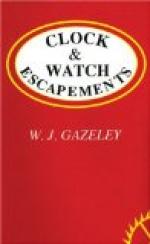all the seats
a are of precisely the same height,
measured from
B, and that a watch plate placed
in the jaws
C will be held exactly parallel
with the said bed
B. We must next provide
two pillars, shown at
D E, Figs. 109 and 111.
These pillars furnish support for sliding centers which
hold the top pivots of the escape wheel and pallet
staff while we are testing the depths and adjusting
the pallet stones. It will be understood that
these pillars
D E are at right angles to the
plane of the bed
B, in order that the slides
like
G N on the pillars
D E move exactly
vertical. In fact, all the parts moving up and
down should be accurately made, so as not to destroy
the depths taken from the watch plate
A.
Suppose, to illustrate, that we place the plate
A
in position as shown, and insert the cone point
n,
Figs. 109 and 112, in the pivot hole for the pallet
staff, adjusting the slide
G N so that the cone
point rests accurately in said pivot hole. It
is further demanded that the parts
I H F G N D
be so constructed and adjusted that the sliding center
I moves truly vertical, and that we can change
ends with said center
I and place the hollow
cone end
m, Fig. 112, so it will receive the
top pivot of the pallet staff and hold it exactly
upright.
[Illustration: Fig. 110]
[Illustration: Fig. 111]
[Illustration: Fig. 112]
The idea of the sliding center I is to perfectly
supply the place of the opposite plate of the watch
and give us exactly the same practical depths as if
the parts were in their place between the plates of
the movement. The foot of the pillar D
has a flange attached, as shown at f, which
aids in holding it perfectly upright. It is well
to cut a screw on D at D’, and
screw the flange f on such screw and then turn
the lower face of f flat to aid in having the
pillar D perfectly upright.
DETAILS OF FITTING UP ESCAPEMENT MATCHER.
It is well to fit the screw D’ loosely,
so that the flange f will come perfectly flat
with the upper surface of the base plate B.
The slide G N on the pillar D can be
made of two pieces of small brass tube, one fitting
the pillar D and the other the bar F.
The slide G N is held in position by the set
screw g, and the rod F by the set screw
h.
[Illustration: Fig. 113]
[Illustration: Fig. 114]




